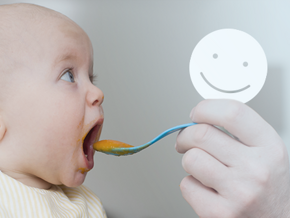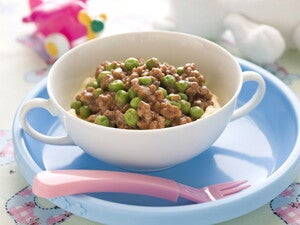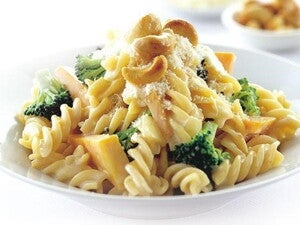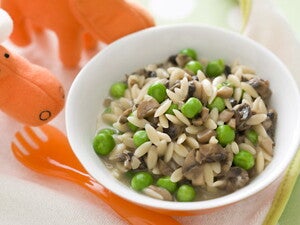
Baby Nutrition - Mini Meals For Mini People
The dietary needs for infants during the first year of life are higher than those of adults. Infants have small tummies, but big nutritional needs because their bodies are rapidly growing in the first years of life.
As their bellies are smaller than those of adults, the nutritional requirements for infants is relatively rich in energy, vitamins and minerals. Breastfeeding is the best source of nutrition for all infants up to around 6 months, then other solid foods can be introduced. Solid foods should meet the dietary needs for infants and come from a balanced nutritious diet including foods from each of the food groups (vegetables, fruit, meat and other protein sources, dairy foods, grains and cereals). Focus on your baby’s nutrition by offering smart eating choices in between mealtimes.
The food that you offer your baby, and the ways you offer it, introduce eating patterns that can continue into later life. This can affect both their nutritional intake and weight as your child grows older. For this reason, it’s important not to think of the foods you offer your baby outside of traditional mealtimes as snacks or treats, but as essential mini meals or ‘in-betweeners’. Every bite counts towards your baby’s nutrition so try to provide nutrient-rich food and avoid high-sugar or high-salt ‘snack’ foods.
What should an ideal mini meal include?
A healthy mini meal consists of foods that not only meet the dietary needs for infants, but are in the appropriate texture as well. It might include small pieces of foods that they can pick up and put in their mouth themselves. A small serving of soft, diced fruits or vegetables, alongside a protein-rich food, such as cheese or yoghurt, is a great combination. These mini meals include foods from any of the main food groups which provide the nutrients needed for infants throughout the day:
1. Fruits
Fruits contain many essential nutrients, such as vitamin C, folic acid, potassium, and fibre. Vitamin C helps body tissues grow and repair. Oranges, mango and berries are great sources of vitamin C. Avocado and banana are good sources of folic acid, potassium, and vitamin C too!
Babies between 7-12 months should aim to have ½ piece of fruit a day (one serve of fruit is equivalent to 20g).
2. Vegetables
As well as being high in many essential nutrients, vegetables (and fruits) are naturally low in fat and calories. Vegetables such as broccoli, pumpkin, carrots, and peas are a good source of vitamin A, vitamin C, fibre, potassium and folate. Vitamin A is an important nutrient that helps keep eyes and skin healthy and protects against infections. Sweet potatoes, carrots, and spinach are all rich in this vital vitamin.
Babies between 7-12 months should aim to have 1.5-2 serves of vegetables a day (one serve is equivalent to 20g).
3. Dairy
Dairy foods contain calcium, vitamin D, and potassium—all of which are important for your baby’s growth and development. Calcium and vitamin D work together to build strong bones and teeth. Low-sugar yoghurts and cheese provide valuable sources of calcium and potassium.
Babies between 7-12 months should aim to have 1/2 serve of dairy a day (one serve is equivalent to 20ml yoghurt or 10g cheese) in addition to their usual breastmilk or infant formula.
4. Grains
Grains are an important source of fibre and B vitamins such as niacin and riboflavin. Niacin and riboflavin play an important role in releasing energy from foods, great for a baby on the move. Iron-fortified infant cereals, soft crackers, soft, cooked pasta and rice are grain foods that are perfect for your baby.
Babies between 7-12 months should aim to have 1 fortified infant cereal serve (20g) and 1.5 serves of other grains per day (1 slice of bread is an example of one serve)
5. Meat/fish/protein foods
Foods from this group are rich in protein, and also supply your baby with many other important nutrients, such as iron. Proteins work as ‘building blocks’, essential for growth and development of our little ones, and iron helps blood carry oxygen to your baby’s organs and muscles. Red meat and cooked eggs are packed with protein and iron. Beans, such as chickpeas, are a good non-meat source of protein.
Babies between 7-12 months should aim to have 1 serve of meat or other protein source a day (one serve is equivalent to 30g)
Download our web app so you can easily access these tips, anytime. Simply scroll to the bottom of this page and click ‘Download app’.
Frequently asked questions on baby nutrition
What do infants need to eat?
Nutrition for newborns includes either breast milk or infant formula as the primary source of nutrition for up to the first six months. At around six months of age, they can start to explore solid foods, including pureed iron-rich foods, fruits, vegetables, grains, and proteins. As your little one grows, introduce a variety of textures and flavours, gradually increasing the complexity of their meals. Offer age-appropriate finger foods and encourage self-feeding when they’re ready. Talk to your healthcare professional for personalised guidance on your baby's nutritional needs and any specific dietary considerations.
Sources:
Australian Food Composition Database. Accessed 25/07/2022 at https://www.foodstandards.gov.au/science/monitoringnutrients/afcd/Pages/foodsearch.aspx
Australian Guide to Healthy Eating – Accessed 25/07/2022 at Serve sizes | Eat For Health - https://www.eatforhealth.gov.au/food-essentials/how-much-do-we-need-each-day/serve-sizes
Australia New Zealand Food Standards Code - Standard 1.2.7 - Nutrition, Health and Related Claims. Accessed 25/07/2022 at https://www.legislation.gov.au/Details/F2013L00054





